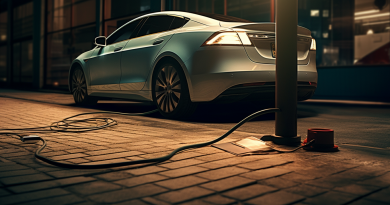Gretchen Whitmer: When We Say “Mobility,” We Really Mean “Cars”
I checked my phone Saturday morning to see a news article on my feed that Michigan Governor Gretchen Whitmer had convened a “Council on Future Mobility.” Hurrah, right!? I quickly was dismayed to find that virtually all of the participants are pretty squarely auto sector people. Surprising? No. Disappointing, though? Absolutely.
Electric SUV As Metaphor
The last pre-COVID event I attended was the C2ES Climate Leadership Conference at the Westin Book Cadillac. There were some good sessions. Best conference food I’ve ever had. There was also a lot of, “hey, let’s pat ourselves on the back and talk about the great stuff we are doing.” The double-edged sword of the CSR realm is that corporations have a lot of resources, but they also love to think that they’re not, you know, destroying the planet for profit. I’m not a purist about this. I’m getting an MBA, and my politics comprises a diversity of pro-market, pro-capitalist, and, occasionally, overtly socialist objectives (e.g. “all humans deserve trains”).
There isn’t an “either/or.” We’re not going to get rid of cars tomorrow. But I do think that it’s really irresponsible for companies to talk about “decarbonization” and fail to acknowledge how mass consumption– of cars, especially- contributes to carbon footprint. This is one of the fundamental points of Naomi Klein’s book This Changes Everything. Klein argues not that capitalism is evil and should be disbanded, but rather that we can’t simply mass-consume our way out of the climate crisis.
Climate Leadership Conference: Decarbonizing Transportation, One Electric SUV At A Time?
Most telling for what was on my mind at that point in time, while working on transit advocacy, was Senator Debbie Stabenow’s keynote on decarbonizing transportation. The keynote didn’t actually talk about transportation at large. Just cars. (Her office did not respond to a request for comment at the time). The Senator isn’t exactly the biggest DDOT rider, let’s say? So, times haven’t really changed. We’re still thinking about the single-occupant motorcar. We’re just now talking about an electric, #connected single-occupant motorcar.
So, this isn’t a question of whether there is interest. It’s a question of why there isn’t more effort. And effort often begins with gestures, messaging, and language. That is, in this case, nonexistent coming from the governor’s office.
This is more an issue of messaging and effort than anything else. You can argue that automakers aren’t doing enough to stop climate change. Or, you can say that they’re not putting enough weight behind advocacy for things like carbon tax. You can argue that their efforts often contradict each other. You can’t, however, argue that they don’t have the policies. Or that they don’t have smart people thinking about these things. They do. I know a few GM employees who are carless and ride their bikes to work at the Renaissance Center. The automakers count among their staff bases a number of the region’s leading transit advocates. So, this isn’t a question of whether there is interest. It’s a question of why there isn’t more effort. And effort often begins with gestures, messaging, and language. That is, in this case, nonexistent coming from the governor’s office.
Transformative Potential, Moving Beyond Just Tech And Commercialization
If we don’t get serious about infrastructure, we’re going to continue to fall behind as a state. We’re going to continue to fall behind as a country. The notion that everyone has to own a car equates to about a $10,000 tax per year on every worker. This requires a focus on equity and inclusion: Not everyone should have to own a car or have a subscription to privatized mobility-as-a-service or what have you.
One reader wrote to me: “[This] is where a humanities or philosophy approach is more important than the intricacies of tech or commercialization.” It’s great to talk about decentralizing things like power generation or grids– vital in the discussion of how the hell we’re going to charge all of these electric cars. This could have transformative potential for neighborhood economic empowerment. But that’s not how GM, Ford, DTE, or others are thinking about it. They’re still thinking that everything is going to be cars, cars, cars, forevermore. In other words, transformation is great, but we need to figure out how to transform without substantial improvements in terms of access or equity.
When the governor empowers a committee to study this from a policy standpoint without a single transit advocate, that sends a message that the state cares about you buying cars. The state doesn’t care about you getting where you need to go. The Governor needs to get serious about transit infrastructure if she wants to get serious about mobility.




